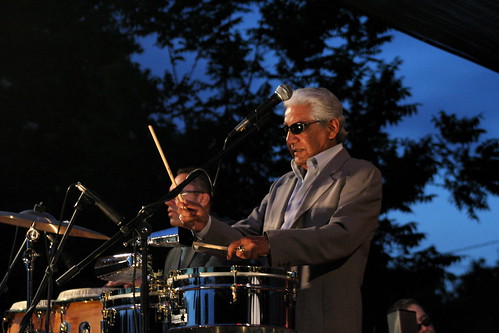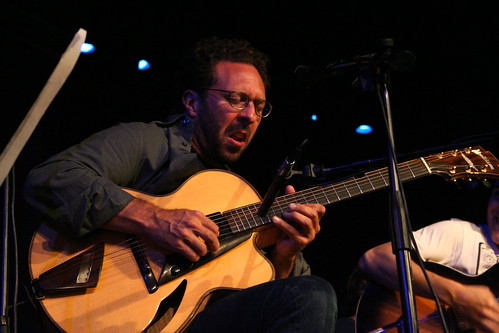Aging audience?
But classical music is especially challenged in this area. Jazz is too. Just go to a jazz concert or a festival, and observe the audience. It's not the most youthful group. Thankfully, the jazz audience isn't quite as old as the classical audience, and it's certainly more diverse. A recent study (2006) by the Jazz Alliance International (PDF download) says that 41 percent of the jazz audience is under 39 year old, which quite frankly surprised me. Another 37 percent are between 40 and 55. I had expected the numbers to be much older.
Now let's think about those numbers and ages for a moment. Those 41 percent of people under 39 years old, did not grow up in a world where jazz was popular music. And most of those in the 40-55 age group didn't either. These are children of the rock and roll generation. They obviously came to find out about, or enjoy jazz at some point - but when? And how? This is the information I'd like to find out. I often ask people who become members of the station how they found out about the station, and how they got into jazz. Some have stories of growing up listening to mom and dad play records by Dave Brubeck and Shelly Manne, or going to see the CTI All Stars at the Warnors Theatre as teenagers. But most of them seem to have stumbled across the music as adults. And I say "stumbled" because it often seems more like an accident, as opposed to "seeking out" the music. They happen across the radio station, like the music, and get become "jazz fans". Maybe they had some early exposure to the music at home, but most of them probably (my conjecture here) we're active jazz fans in their teens or twenties.
If true, this dispels the myth that jazz has no future if it's not "pop" music. Pop is targeted to a teen audience, and if yesterdays teens of the (1960's and 70's) are becoming jazz fans in their 30s or 40s. It also dispels the myth that adults musical tastes are set in stone by the time they reach adulthood.
It also raises some interesting questions, such as: If most jazz fans become jazz fans as adults, and most are doing so in some sort of accidental manner, how can we "nudge fate" a bit and make things a little less accidental, and do some real audience development? Another interesting stat: 41 percent said that the reason they don't attend more jazz events is... inconvenient location. Again, not what I expected.
Sandow also raises another issue that I've been thinking about, and I'm not sure if I agree with him. He says there is a ray of hope, because the number of young people PLAYING classical music has stayed the same over the years. Conventional wisdom would lead one to believe that those student musicians would then become the next generation of classical fans. First, if this was the case, wouldn't we see less of an overall "aging" of the classical audience, if all those young students from 20 years ago are now active in the classical "audience?" Second, and more important, I'm not sure that most young people who are in a jazz band, or classical ensemble are interested in the music itself. I had a discussion with a local high school band director a few days ago. Keep in mind, this is a school with a very distinguished music program in both classical and jazz. I asked him how many of his students in his jazz band would be jazz listeners in 10 years. He said maybe three or four. Now that's certainly higher than the average high school population, but it's still not great. The same goes for the kids in their classical ensembles. They may play Mussorgsky or Holst, but they have no interest in going home and listening to classical music, or going to hear an orchestra or chamber ensemble perform.
Also, another question that turns conventional wisdom on its ear: Are jazz musicians part of the jazz audience in a significant way? I always remark at the relatively small number of musicians I see at local jazz events. Maybe they all have gigs on those nights, but I doubt it.
All of this, to me, points to the need and importance of a strategic effort at audience development for jazz. It can target young kids, the pre-teens who don't yet have closed minds to something that sounds "weird." It can also target adults who might someday "accidentally" find out about jazz. But instead of waiting for fate, it can be proactive, and get in front of them, in an accessible, yet not "watered down" way. It can show them that jazz is something they already like, and enjoy, they just don't know it. It can show them that jazz doesn't have to be dry, boring or stuffy. It can show them that jazz is relevant and a lot of fun. But as long as the majority of our effort at jazz education is focused on attempting to crank out the "next" John Coltrane, we might be missing the point. Of course traditional jazz education is VERY important. But we have more musicians today than ever before, a record number of jazz CDs released every year, and fewer and fewer venues and listeners to support them.
Now, I'll admit there might be some problems with my conclusions. The jazz radio audience, the jazz purchasing audience and the jazz event audience aren't necessarily the same audience. The JAI survey was apparently some sort of web survey, so I don't know how accurate it is. Nor are my anecdotal observations reliable in any sort of statistical method. But at the very least, I think this is an issue that needs to be discussed some more. We need some reliable research on where jazz listeners come from, when they become jazz listeners, and why. I've only begun looking into this issue, so I'll keep you up to date with anything else I come up with.







